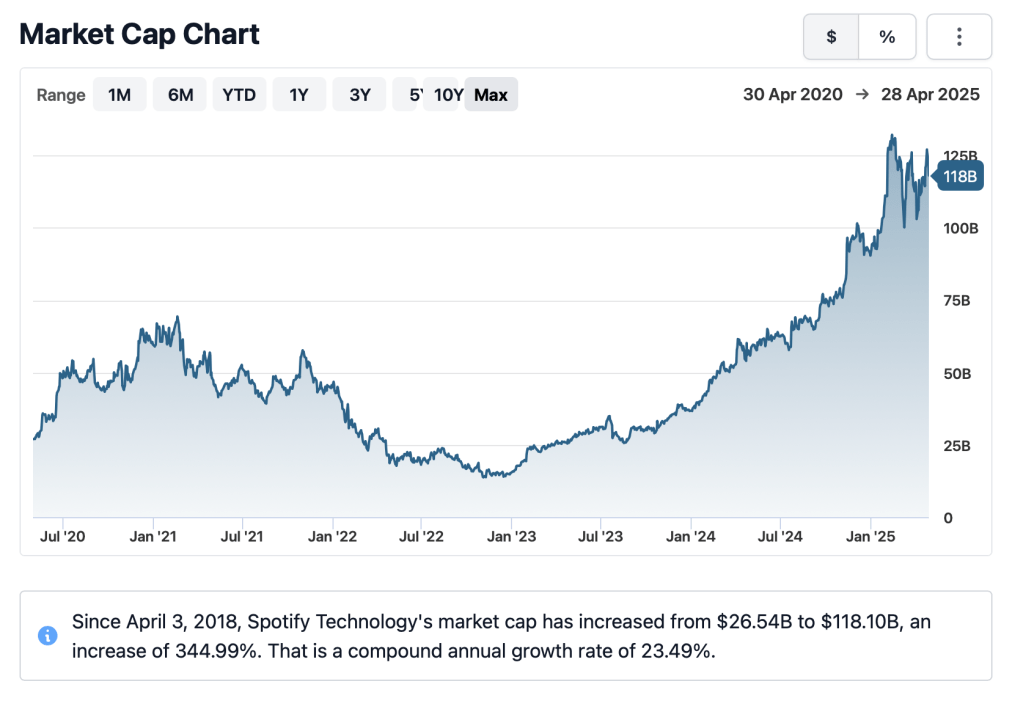In this op-ed, Christ Castle argues that Spotify made billions while underpaying songwriters and musician. With new royalty talks coming, says the artist advocate, an increase in Spotify songwriter royalties is overdue.
Earnings signal time for fairer Spotify Songwriter Royalties
Op-ed by CHRIS CASTLE of Music Tech Policy
Spotify, as a dominant player in the music streaming industry, has undeniably played a crucial role in shaping the modern music economy for better or worse. However, the economic disparity between Spotify’s workers and especially executives compared to the creatives who make its platform viable deserves a major repair by the Copyright Royalty Judges in the upcoming Phonorecords V proceedings. This re-look for economic justice should involve a catch-up payments to songwriters and musicians, particularly non-featured musicians in proportion to the growth in Spotify’s market capitalization.

MORAL RESPONSIBILITY TO CREATORS
Spotify’s growth and market dominance would not have been possible without the creative output of songwriters, musicians, and other contributors who “invested” their talent and work by accepting a revenue share in an artificially constrained revenue pool due to Spotify’s below-market pricing to benefit its own growth story. It’s only fair that those who contributed to building Spotify’s value—both directly and indirectly—be compensated adequately, especially given the windfalls enjoyed by its executives and shareholders. This is particularly true given reports that Spotify now intends to change strategy and exert pricing power.
UNFAIR BURDEN ON ARTISTS
By setting subscription prices below market value due to its predatory pricing strategy, Spotify may have prioritized user growth and market dominance over fair compensation for the very creators who sustain its platform. This artificially low revenue base pushed some of the financial risk onto artists, asking them to bear the burden of Spotify’s long-term ambitions for the long term benefit of surviving piracy. Spotify’s executives now enjoy the fruits of that strategy but creatives still get the same crappy rates and no compensation for their investment. Catch-up payments would recognize the sacrifice artists made during Spotify’s growth years.
ECONOMIC INEQUITY AMONG NON-FEATURED MUSICIANS
Non-featured musicians, such as session players and background vocalists, are often the most overlooked contributors as I noted in a WIPO paper I wrote with Professor Claudio Feijoo. The labor of non-featured musicians enriches recordings and directly enhances the quality of content on the platform, yet they typically receive a miniscurle fraction of the compensation that featured artists or top-tier songwriters earn and receive no streaming royalties. A fairer distribution model, including retroactive catch-up payments, would help to address this inequity.
ALIGNING WITH THE COST OF LIVING
As inflation has increased over the past several years, the purchasing power of revenue from music streams has decreased, particularly for songwriters. Those same songwriters receive a COLA for mechanical royalties for the same songs if sold in a physical record, but are denied the same protection for streaming. A cost-of-living adjustment for streams over the last five years with a prospective COLA would not only recognize economic realities but also demonstrate that Spotify (and other beneficiaries of the blanket mechanical license) values the financial wellbeing of creators who have sustained its success.
STRENGTHENING LONG-TERM RELATIONSHIPS
Making catch-up payments could be a strategic move for Spotify’s long-term health. The music industry is built on relationships, and by prioritizing fair compensation now, Spotify could strengthen its partnerships with creators, foster goodwill, and safeguard its reputation against criticisms of exploitation which happens daily in the current atmosphere of exploitation and commodification..
PRACTICAL IMPLEMENTATION
Spotify could allocate a percentage of its revenue specifically for catch-up payments. This pool could be distributed to all creators based on historical streaming data, ensuring that everyone from top-tier artists to non-featured musicians receives a share. However, there are inherent challenges with this approach that must be acknowledged. A revenue share pool risks perpetuating the flaws of the existing royalty model, as it could compound the current inequitable dynamics. Instead, Spotify could dedicate a portion of its public stock—or phantom stock—specifically for creators.
Allocating stock directly ties creators’ compensation to the growth of Spotify’s market value over the years. This method avoids the contentious “divide the pie” approach, which has historically left creatives feeling shortchanged and marginalized. By decentralizing the control over revenue slices, Spotify eliminates its own role in determining arbitrary shares, allowing external market dynamics to guide equity-based growth.
Advantages of Stock Allocation:
- Equity-Based Growth: Creators directly benefit from the company’s increasing market value, reflecting their indispensable uncompensated contribution to Spotify’s success.
- Eliminating Pie Control: This avoids placing Spotify in the position of arbitrarily dividing revenue slices, which often leads to dissatisfaction and both actual and perceived unfairness.
- Transparency and Trust: The allocation process could be made highly transparent, further building goodwill and trust between Spotify and the creative community.
- Phantom Stock Flexibility: Phantom stock—a promise of future cash tied to the stock’s value—might be especially appealing, as it avoids diluting existing shareholder equity while still delivering fair compensation.
This approach acknowledges the sacrifices made by creatives during Spotify’s growth phase and transitions their compensation into a model that incentivizes long-term alignment between creators and Spotify’s financial success.
By addressing this disparity, Spotify has an opportunity not only to correct the imbalances of the past but also to lead the industry toward a more equitable future in the streaming workhouse. Creators are the lifeblood of any music platform; without them, there would be no Spotify. It’s time for the company to reflect that reality in its compensation practices and the upcoming proceedings in Phonorecords V is the ideal opportunity to make it so.





